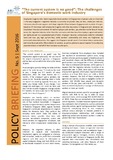| dc.contributor.author | Wee, Kellynn | |
| dc.contributor.author | Goh, Charmian | |
| dc.coverage.spatial | Singapore | |
| dc.date.accessioned | 2019-12-20T15:01:45Z | |
| dc.date.available | 2019-12-20T15:01:45Z | |
| dc.date.issued | 2016-09 | |
| dc.identifier.uri | https://opendocs.ids.ac.uk/opendocs/handle/20.500.12413/14916 | |
| dc.description.abstract | Employment agents who match migrant domestic workers to Singaporean employers play a critical role in the way Singapore’s migration industry is currently structured: they set fees, create job matches, intervene when fissures appear, and shape migration flows between Singapore and countries of origin. Based on 47 interviews with employment agents and other key actors in Singapore and Indonesia, we break down the cost components for both employers and workers, pay attention tothe flow of money across the migrationindustry rather than the sum costs, and show howthe employer, agent and worker are tightly bound in a complicated web of debt. Employers become contractually liable for defaulted loans and must pay high upfront fees, whileworkers’ vulnerabilityand stress are heightened by protracted salary deductions. We suggest that Singapore would benefit from better labour protections and more thorough skills differentiation for workers, as well as policies to prevent agents from collecting placement loans on behalf of their overseas counterparts. | |
| dc.description.sponsorship | DFID | |
| dc.description.sponsorship | Migrating out of Poverty | |
| dc.language.iso | en | |
| dc.publisher | Migrating out of Poverty | |
| dc.title | “The Current System is no Good”: The Challenges of Singapore’s Domestic Work Industry | |
| dc.type | Other | |
| dc.rights.holder | University of Sussex | |
| dc.identifier.externaluri | http://www.migratingoutofpoverty.org/files/file.php?name=rp08-mig-ind-mi-policy-brief-v9.pdf&site=354 | |

